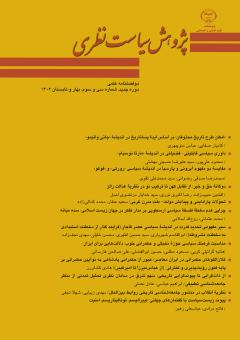از ذاتگرایی تا پیوندگرایی تاریخی: سهم شرق در سامان نظری تحلیل تمدنی از منظر جامعهشناسی تطبیقی
محورهای موضوعی : پژوهش سیاست نظری
ابراهیم عباسی
1
![]() ,
عادل نعمتی
2
,
عادل نعمتی
2
1 - دانشیار گروه علوم سیاسی دانشگاه شیراز
2 - دانشجوی دکتری علوم سیاسی, دانشکده حقوق و علوم سیاسی، دانشگاه شیراز، شیراز، ایران
کلید واژه: ذاتگرایی, شرقشناسی, اروپامحوری, تحلیل تمدنی و آسیا در برابر غرب. ,
چکیده مقاله :
در این نوشتار سعی میکنیم تا نشان دهیم که چارچوب روشی «ذاتگرایی تاریخی» (نفی غربی و مفصلبندی خود به عنوان دیگریِ غربی) که مبنای مفهومپردازی برخی محققان ایرانی از جغرافیای شرق در برابر جغرافیای غرب است، نتیجهای جز بازتولید چرخۀ شوم چارچوبهای نظری دوگانه «شرقشناسی» و «اروپامحوری» در تحلیل تمدنی ندارد. پرسش اساسی آن است که چطور در زمانه تسلط نظم تمدنیِ مدرنیته غربی، ما غیر غربیان میتوانیم بر مبنای ویژگیهای تاریخی و جغرافیایی خود سخن گفته، نظم تمدنی خود را مفصلبندی نماییم؟ فرضیه این پژوهش در پاسخ به این پرسش بنیادین، آن است که یک سوژۀ غیر غربی نمیتواند راهحل «دیگریِ» بودن نظم تمدنیِ مدرنیته غربی را در قالب «ذاتگرایی تاریخی» پیش گیرد. استراتژی ذاتگرایانه، فرجامی غیر از بازتولید همان مفردات شرقشناسی دانشگاهی غربی به عنوان ماهیت تاریخی شرقی ندارد. برعکس، یک سوژه غیر غربی، زمانی میتواند بر مبنای مفردات تاریخی و جغرافیایی جوامع خود، نظم تمدنیاش را شکل دهد که از یک میراث مشترک جهانی که پیونددهندۀ او با سوژۀ غربی است، در قالب یک «پیوندگرایی تاریخی» برای سخن گفتن استفاده کند. یافتههای این مقاله نشان میدهد که «جامعهشناسی تطبیقی مبتنی بر تحلیل تمدنی» ساموئل آیزنشتاد متاخر، کاربستپذیرترین نظریه برای بررسی این ادعاست. این نظریه، در عین حالی که از میراثی مشترک به عنوان «شرایط امکانی نظم تمدنی» در تاریخ جهانی سخن میگوید، بر کثرتگرایی «صورتبندیهای متمایز نظمِ تمدنی» و فقدان یک نظم تمدنی هژمونیک در تاریخ جهانی که مدعی «مشروعیت» باشد، تأکید دارد. این نوشتار، چارچوب مفهومی «پیوندگرایی تاریخی» را جایگزین «ذاتگرایی تاریخی» در کتاب «آسیا در برابر غرب» شایگان ارائه میدهد. منظور از «پیوندگرایی تاریخی»، بیان یک رابطۀ «تکاملیِ تک¬خطی» بین جوامع غربی با غیر غربی نیست که جوامع غیر غربی باید و لاجرم همان مسیر جوامع غربی را در مفصل¬بندی صورت¬بندی اجتماعی خود طی کنند؛ بلکه برعکس، «پیوندگرایی تاریخی» به دنبال یک «تاریخ جهانی بدون مرکز» است که غربی و غیر غربی بر مبنای یک میراث مشترک و پیوندگرایانه، هر یک بر مبنای مفردات تاریخی و جغرافیایی جوامع خود، به صورت مستقل سخن بگویند و صورتبندیهای متمایز و متفاوتی از نظم تمدنی را در سطح تاریخ جوامع خود تولید کنند. به بیانی «پیوندگرایی تاریخی»، یک «وحدت در عین کثرت» است. روش این مقاله، تاریخ ایدهها یا تاریخ تفکر مبتنی بر رویکرد جامعهشناسی تطبیقی و روش گردآوری دادهها، رجوع به منابع اصیل نظریهپردازان نظم تمدنی است.
In this paper, we attempt to demonstrate that the theoretical framework of "Historical Essentialism" (negation of the West and articulation of oneself as the Western other) used by some Iranian researchers as the basis for the conceptualization of the contrast between the geography of the East against the geography of the West, results in no more than the reproduction of the evil cycle of the duality of "Orientalism" and "Eurocentrism" in civilizational analysis. The fundamental question is how, in the era of Western modernity's domination, can we, as non-Westerners, articulate our own civilization based on our historical and geographical characteristics? The hypothesis of this research is that a non-western subject as a solution cannot assume the role of being "other" of the western modernity's civilizational order in the form of "Historical Essentialism". The essentialist strategy has no solution other than reproducing the same vocabulary of Western academic Orientalism as the historical essence of the East. On the contrary, a non-western subject can form their civilizational order based on the historical and geographical vocabulary of their societies by using a common global heritage that connects them with the western subject, in the form of a "Historical Hybridity". The findings of this article show that the late works of Samuel Eisenstadt about "comparative sociology based on civilizational analysis" is the most applicable theory to investigate this claim. This theory, while acknowledging a shared heritage as "conditions of possibility for civilizational order" in world history, emphasizes pluralistic "articulations of civilizational order" and the absence of a hegemonic civilizational order in world history that could claim "legitimacy. " This paper presents the conceptual framework of "Historical Hybridity " as a replacement for "Historical Essentialism that is presented in Shayegan's "Asia versus the West". The meaning of "Historical Hybridity" is not to express a "unidirectional evolutionary" relationship between Western and non-Western societies, that non-Western societies must necessarily follow the same path as Western societies in the articulation of their social formations; Rather, on the contrary, it seeks a "global history without a center" in which Western and non-Western people could on the basis of a common and hybrid heritage, speak independently based on the historical and geographical singularities of their societies and produce different formations of civilizational order at the level their societies' history. In other words, "Historical Hybridity" is a "unity in diversity. " The method of this article involves the history of ideas or the history of thought based on the comparative sociology approach and data collection method is referring to the original sources of civilizational order theorists.
